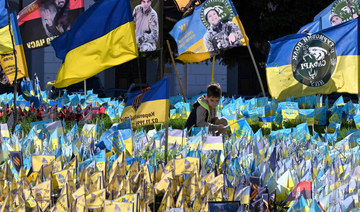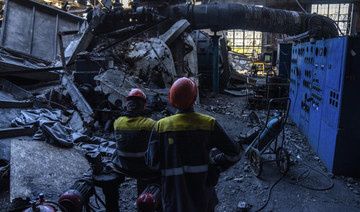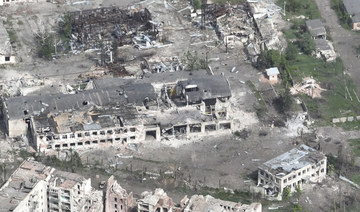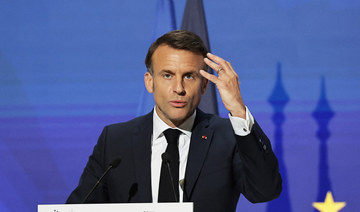WASHINGTON: The US Supreme Court on Thursday dealt a President Donald Trump a major setback on his hard-line immigration policies, blocking his bid to end a program that protects from deportation hundreds of thousands of immigrants — often called “Dreamers” — who entered the United States illegally as children.
The justices on a 5-4 vote upheld lower court rulings that found that Trump’s 2017 move to rescind the Deferred Action for Childhood Arrivals (DACA) program, created in 2012 by his Democratic predecessor Barack Obama, was unlawful.
Conservative Chief Justice John Roberts joined the court’s four liberals in finding that the administrations actions were “arbitrary and capricious” under a federal law called the Administrative Procedure Act.
The ruling means that the roughly 649,000 immigrants, mostly young Hispanic adults born in Mexico and other Latin American countries, currently enrolled in DACA will remain protected from deportation and eligible to obtain renewable two-year work permits.
The ruling does not prevent Trump from trying again to end the program. But his administration is unlikely to be able to end DACA before the Nov. 3 election in which Trump is seeking a second four-year term in office.
“We do not decide whether DACA or its rescission are sound policies. We address only whether the agency complied with the procedural requirement that it provide a reasoned explanation for its action,” Roberts wrote.
The ruling marks the second time this week that Roberts has ruled against Trump in a major case following Monday’s decision finding that gay and transgender workers are protected under federal employment law.
The court’s four other conservatives including two Trump appointees, Neil Gorsuch and Brett Kavanaugh, dissented.
“Today’s decision must be recognized for what it is: an effort to avoid a politically controversial but legally correct decision,” conservative Justice Clarence Thomas wrote in dissent.
Trump’s administration has argued that Obama exceeded his constitutional powers when he created DACA by executive action, bypassing Congress.
A collection of states including California and New York, people currently enrolled in DACA and civil rights groups all filed suit to block Trump’s plan to end the program. Lower courts in California, New York and the District of Columbia ruled against Trump and left DACA in place, finding that his move to revoke the program violated a US law called the Administrative Procedure Act.
Only one justice, liberal Sonia Sotamayor, embraced arguments made by plaintiffs that the policy may have been motivated by discriminatory bias against immigrants. Sotamayor is the court’s first Hispanic justice.
Trump has made his crackdown on legal and illegal immigration, including pursuing construction of a wall along the US-Mexican border, a central part of his presidency and his 2020 re-election campaign.
DACA recipients and their supporters in Congress and in the business community welcomed the ruling.
“I feel content. I think the decision was what we deserved, but at the same time I am also thinking we still have to defend the program,” said Melody Klingenfuss, a 26-year-old DACA recipient and organizer with the California Dream Network.
The Trump administration is reviewing the ruling, a senior Department of Homeland Security official said.
CENSUS RULING
Roberts a year ago also cast the decisive vote in a Supreme Court loss for the Republican president when the justices blocked Trump’s administration from adding a citizenship question to the 2020 census that critics said was an effort to dissuade immigrants from taking part in the decennial population count. That case raised similar questions about whether Trump’s administration followed the correct procedure in reaching a policy decision.
Immigrants had to meet certain conditions to qualify for DACA enrollment such as not being convicted of a felony or significant misdemeanor and being enrolled in high school or having a high school diploma or equivalent.
Government figures show that upwards of 95 percent of current enrollees were born in Latin America, including 80 percent from Mexico, followed by El Salvador, Guatemala and Honduras. Nearly half live in California and Texas.
The average age of DACA enrollees is 26 years old, with slightly more women than men among the current population, according to the latest government statistics.
Obama created the DACA program after Congress failed to pass bipartisan legislation that would have overhauled US immigration policy and offered protections for the immigrants known as “Dreamers.” That moniker was drawn from the name legislation known as the DREAM Act, short for Development, Relief and Education for Alien Minors Act.
The young immigrants for whom the program was devised, Obama said, were raised and educated in the United States, grew up as Americans and often know little about their countries of origin.
Trump has given conflicting messages about the “Dreamers.” He said in 2017 that he has “a great love” for them even as he sought to end DACA. In 2019, Trump called some DACA recipients “very tough, hardened criminals,” ignoring the guidelines that prevent convicted criminals from enrollment.
US Supreme Court blocks Trump bid to end 'Dreamers' immigrant program
https://arab.news/jqcgj
US Supreme Court blocks Trump bid to end 'Dreamers' immigrant program
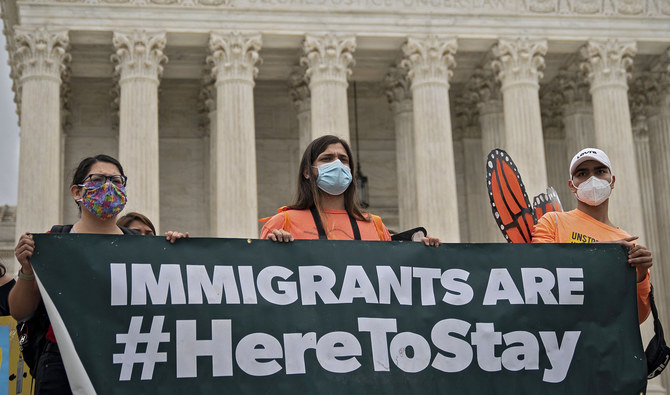
- The ruling means that the roughly 649,000 immigrants enrolled in DACA will remain protected from deportation and eligible to obtain renewable two-year work permits
- Trump’s administration has argued that Obama exceeded his constitutional powers when he created DACA by executive action, bypassing Congress
Russia’s FSB says it killed saboteur recruited by Ukraine

- The man was a Russian national recruited by Ukraine’s military intelligence to carry out the attack in the Leningrad region
- He had entered Russia from Lithuania in March after receiving training there
MOSCOW: Russia’s FSB state security service said on Friday its officers had killed a saboteur who had been recruited by Ukraine and was planning to attack a fuel terminal in northwestern Russia with explosives.
The FSB said in a statement the man was a Russian national recruited by Ukraine’s military intelligence to carry out the attack in the Leningrad region, and that he had been killed after shooting at security agents.
The FSB said he had entered Russia from Lithuania in March after receiving training there.
Vilmantas Vitkauskas, Head of the Lithuanian National Crisis Management Center, denied the allegation.
“Russia has been systematically conducting disinformation campaigns and provocations for a long time in order to raise tensions among societies and allies and to cover its aggressive actions,” he said.
“This disinformation spread by the FSB is a case in point. One of the objectives of such aggressive activities is to influence Lithuania’s support for Ukraine.”
There was no immediate comment by Ukraine, were Russian forces are waging war after Moscow’s full-scale invasion in February 2022.
Little hope of Ukraine breakthrough during Xi France visit: observers

- “France and the European Union expect him to use his influence on Russia, but Xi Jinping has nothing to offer on Ukraine,” said a former European diplomat
- Xi is due to make a state visit to France on Monday and Tuesday
PARIS: French President Emmanuel Macron will next week make a new push to try and dissuade China’s Xi Jinping from supporting Russian President Vladimir Putin’s war against Ukraine but is unlikely to make a breakthrough on ending the conflict during the visit, observers say.
President Xi’s visit is set to be rich on symbolism — with a sumptuous dinner at the Elysee Palace and a trip to the Pyrenees mountains planned — but risks being short on diplomatic success for the French leader.
“France and the European Union expect him to use his influence on Russia, but Xi Jinping has nothing to offer on Ukraine,” said a former European diplomat, asking not to be named.
Xi is due to make a state visit to France on Monday and Tuesday, followed by visits to Serbia and Hungary, two European countries retaining warm ties with Russia.
While Xi and Macron will discuss international crises, trade, climate change and cultural exchanges, the key aim will be to “point out that for Europe, the first issue with China is its position on Ukraine,” said a source close to the French government.
On a visit to China in 2023, Macron had already called on Xi to “bring Russia to its senses” over Ukraine and urged him not to deliver weapons to Moscow.
Little has changed, however. Xi will host Putin for talks in China later this month.
Macron, 46, indicated he had not given up on the idea of trying to get Xi, 70, on his side.
“It’s not in China’s interest today to have a Russia that destabilizes the international order,” the French president said in an interview with The Economist published on Thursday. “We need to work with China to build peace.”
European Commission President Ursula von der Leyen, who has urged Beijing to play a greater role in ending the Ukraine war, will join Macron and Xi for talks on Monday.
Macron has said he will ask the Chinese president to help him achieve that aim when he visits Paris, which is preparing to host the Olympic Games this summer.
There is a historic tradition that peace should reign during the Olympics — although the opening of the Games in Beijing in August 2008 did not halt Russia’s invasion of Georgia.
“On Ukraine, China has done nothing,” said Marc Julienne, director of the Center for Asian Studies at the French Institute of International Relations (IFRI).
In February 2023, China published a 12-point position paper on Ukraine, but it was rejected by Kyiv and its Western allies.
Beijing, which says it is a neutral party in the Ukraine conflict, has been criticized for refusing to condemn Moscow for its offensive.
The United States had accused China of helping Russia carry out its biggest militarization since Soviet times.
US officials say China has provided dual-use supplies that have let Russia regroup in the face of a long delay in US aid to Ukraine.
In April, US Secretary of State Antony Blinken said this included “machine tools, semiconductors, other dual-use items that have helped Russia rebuild the defense industrial base that sanctions and export controls had done so much to degrade.”
China has rejected the US claims as “groundless accusations.”
Macron, too, is expected to raise “concerns” about “the activity of certain Wuhan companies that could be directly involved in or contribute significantly to the Russian war effort,” according to a member of his team.
Beijing is a major supporter of the Russian economy.
China-Russia trade in 2023 reached a record $240 billion, according to customs data, overshooting a goal of $200 billion set by the neighbors.
Experts say Beijing is unlikely to renounce support for Moscow, which it sees as a priority partner in its opposition to the United States.
“Xi Jinping’s priority is the Global South,” said Emmanuel Lincot, a China expert at the Catholic University of Paris.
“There is a congruence in the Sino-Russian bilateral relationship, particularly in the desire to counter the West. Which is not to say that there is no rivalry.”
Human rights group begins legal action over UK’s Rwanda migrant policy

- The group said the government’s Safety of Rwanda policy document was inconsistent with the new law
LONDON: Human rights group Asylum Aid said on Friday it had launched a legal challenge to the British government’s policy of sending asylum seekers to Rwanda in the wake of a new law which seeks to pave the way for the scheme to be put into operation.
The group said the government’s Safety of Rwanda policy document, published on April 29, was inconsistent with the new law which was passed by parliament last month to override a ruling by the UK Supreme Court that the scheme was unlawful.
Britain sanctions Israeli groups, individuals for violence in West Bank

- The four individuals sanctioned were responsible for human rights abuses against Palestinian communities in the West Bank
LONDON: Britain on Friday imposed sanctions on two “extremist” groups and four individuals in Israel who it blamed for violence in the West Bank, its latest package of measures against Israeli settlers.
Britain’s Foreign Office named Hilltop Youth and Lehava as two groups which it said were known to have supported, incited and promoted violence against Palestinian communities in the West Bank.
The four individuals sanctioned were responsible for human rights abuses against these communities, the statement added.
Among them are Noam Federman, who has trained settler groups in committing violence and Elisha Yered, who has justified killing Palestinians on religious grounds.
Violence in the West Bank was already on the rise before Israel’s assault on Gaza, which was triggered by an Oct. 7 Hamas-led attack on southern Israel.
It has escalated since, with stepped-up Israeli military raids, settler violence and Palestinian street attacks.
British foreign minister David Cameron said extremist settlers were undermining security and stability and threatening the prospects for peace.
“The Israeli authorities must clamp down on those responsible. The UK will not hesitate to take further action if needed, including through further sanctions,” he said.
Those sanctioned will be subject to financial and travel restrictions. Britain previously imposed sanctions on four Israeli nationals in February.
Universities take steps to prevent pro-Palestinian protest disruptions of graduation ceremonies
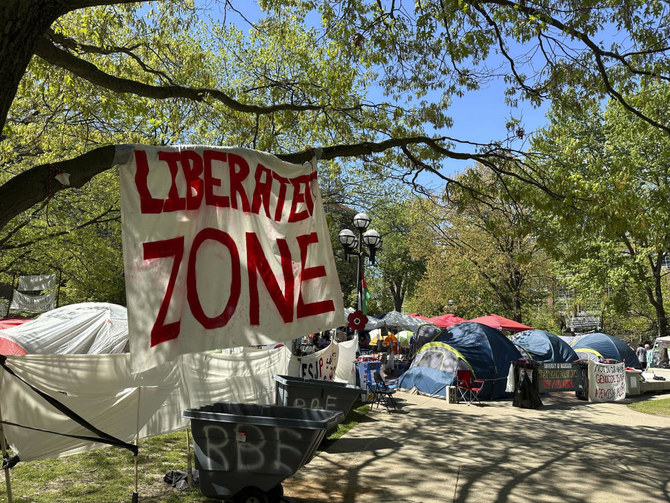
- Students booed and yelled “free Palestine” while the University of Utah president spoke Thursday night at commencement
- “People can exercise their First Amendment rights without disrupting or creating fear,” Burdick said of protesters
MICHIGAN, USA: With student protests over the Israel-Hamas war disrupting campuses nationwide, several major universities are intent on ensuring that commencement ceremonies — joyous milestones for graduates, their families and friends — go off without a hitch this weekend.
It won’t be easy. Colleges are hiring extra security, screening attendees at venues and emphasizing that significant disruptions by pro-Palestinian protesters won’t be tolerated. At the same time, they’re pledging to honor free-speech rights by designating protest zones.
Students booed and yelled “free Palestine” while the University of Utah president spoke Thursday night at commencement. He paused his speech to ask those who were protesting to leave or be removed. Outside the ceremony in Salt Lake City, a group of about 50 people were rallying. There was one arrest.
“Milestone is a perfect word,” said Ken Burdick of Tampa, Florida, describing his daughter’s graduation Saturday at the University of Michigan. He hopes the big day goes untarnished.
“People can exercise their First Amendment rights without disrupting or creating fear,” Burdick said of protesters.
Here’s how some schools are planning to balance things:
UNIVERSITY OF MICHIGAN
More than 8,000 graduates — and 63,000 spectators — are expected for Saturday’s festivities inside Michigan Stadium, known as The Big House. There will be security screening, and disruptive protesters could be subject to removal. Public safety officers and staff who commonly monitor major events, such as fall football games, will be present. Author and historian Brad Meltzer is the featured speaker.
In March, an annual event recognizing students with high academic achievement ended early when pro-Palestinian protesters raised provocative signs and drowned out remarks by President Santa Ono, yelling, “You are funding genocide!” The university subsequently drafted a policy that could lead to student expulsions and staff dismissals for event disruptions, though it hasn’t been finalized.
“It was painful for everyone who had gathered — and especially so for members of our Jewish community,” Ono said two days later.
Protesters have erected dozens of tents on the Diag, a historic space for campus activism more than a mile away from the stadium. They’re demanding that Michigan cut financial ties with companies connected to Israel. There has been no effort to break up the encampment and no arrests.
“We respect and uphold the principles of free expression, and also recognize that no one is entitled to disrupt university activities,” Laurie McCauley, Michigan’s chief academic officer, said in an email to students and staff about commencement.
Blake Richards, 25, is earning a bachelor’s degree in biochemistry. Richards plans to be at the football stadium Saturday after participating in a smaller ceremony Thursday for chemistry students.
“It could take away some great feelings, muddle them,” Richards said of any disruptions. “But truth be told, I’m not bothered. I know others have different opinions; I’m just happy to be here.”
INDIANA UNIVERSITY
The Bloomington, Indiana, campus is designating protest zones outside Skjodt Assembly Hall and Memorial Stadium, where ceremonies will be held Friday for graduate students and Saturday for undergraduates. Nearly 10,000 students are eligible to attend.
A social media post circulating on Instagram urged protesters to wear “your keffiyeh along with your cap and gown” and walk out during Saturday’s remarks by President Pamela Whitten.
Roughly 20 tents set up by protesters remained in place this week in an area known as Dunn Meadow, a mile from the stadium. Dozens of protesters have been arrested there recently, according to the Indiana Daily Student.
Maya Wasserman, a 22-year-old senior in management who is Jewish, said she and her family feel uncomfortable about the prospect of pro-Palestinian protests disrupting commencement. She expressed special concern for her mother and grandmother, who are Israeli.
“It’s unfortunate because we want this event to be about graduating, not politics,” Wasserman said.
At Dunn Meadow, students in lawn chairs or on blankets worked on their final assignments. Jessica Missey, a 20-year-old protester and senior, said she boycotted final exams; some professors, she said, simply canceled them. She has enjoyed the camaraderie at the encampment.
“Commencement is kind of just taking almost a little sidestep for me,” said Missey.
NORTHEASTERN UNIVERSITY
A week after police arrested nearly 100 protesters at Northeastern University, the school is holding its commencement exercises Sunday at Fenway Park, home of the Boston Red Sox, for the fourth consecutive year.
The venue will help security officials monitor the crowd and limit what people can bring. Signs, banners, balloons and full-size flags are prohibited in the stadium, along with most bags. Renata Nyul, vice president for communications, said public safety staffing will be strengthened.
All those entering Fenway will need to pass through metal detectors. About 50,000 graduates, family and friends are expected.
Northeastern is one of several universities in the Boston area that have had pro-Palestinian encampments. Some have let the protests continue, though Northeastern’s camp was broken up.
“While we realize that issues in the world prompt passionate viewpoints, the focus this weekend should be on our graduates and their remarkable achievements,” Nyul said.




